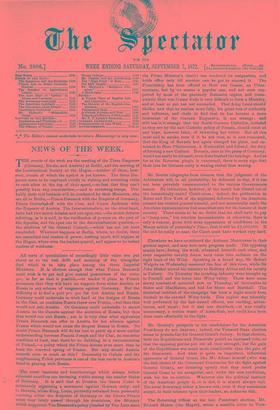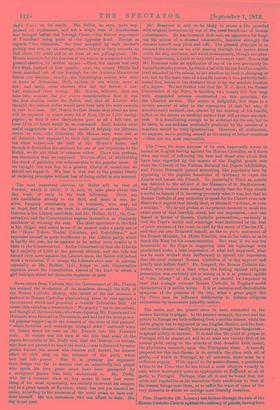The Returning Officer at the late Pontefract election, Mr. Richard
Moxon (the Mayor), wrote a sensible letter to Tues-
day's limes on its result. The Ballot, he says, quite sup- pressed all excitement, and not a single case of drunkenness was brought before the borough Court,—the former experience of Pontefract being quite of the opposite kind. Except as regards "the illiterates," the time occupied by each elector's polling was not, on an average, above thirty or forty seconds, so that about 120 could poll in an hour at one polling-place. Mr. Moxon accounts for the fewness of the voters, as compared with the general election, by several causes :—First, the canvas was only four days, instead of four months ; next, the county Militia had been marched out of the borough for the Autumn Manceuvres before the election ; thirdly, the Knottiugley sailors, who were at home in November, 1868, because it was winter, were at sea ; and lastly, some electors who did not favour a con- test abstained from voting. Mr. Moxon, however, does not Lake into account the per contra considerations that it was the first election under the Ballot, and that all Liberals who thought the contest unfair would have been only the more anxious to vote to a man. Mr. Moxon further thinks that about an hour will be required to count every lot of from 750 to 1,000 voting- papers ; so that if ever Marylebone gave at all a full vote, at least 24 to 30 hours would be so consumed. Such, besides some useful suggestions as to the best mode of helping the illiterate voters to vote.—the illiterates, Mr. Moxon says, were not at all deterred, but appeared in their full numerical proportion to the other voters,—is the drift of Mr. Mown's letter, and though it diminishes the evidence for one of our objections to the Ballot, we do not think it removes either. There was, perhaps, leas abstention than we supposed. But the effect of withholding the check of publicity was unfavourable to the popular cause. If we thought this was due to a greater liberty of conscience, we should not regret it. We fear it was due to the greater liberty of violating principles without fear of being called to any account.



































 Previous page
Previous page